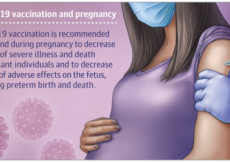February 15th, 2022
Parents and pediatricians were disappointed on Friday when the Food and Drug Administration announced it was postponing a meeting for later this week to review data on Pfizer’s COVID-19 vaccine for children ages 6 months to 5 years old. Hope was growing that the vaccine would be given the green light for this age group by the end of the month. Instead, the American Academy of Pediatrics says we’ll all have to wait until the springtime for the clinical trial to be completed:
FDA officials said the delay will allow more time to review data on a third dose and help decide whether three doses should be considered as part of its decision on emergency use authorization (EUA).
The dose given to young children in the study is 3 micrograms per shot — significantly lower than the 10 microgram shots for 5-to-11-year-olds and 30 micrograms for everyone else 12 years and older. Preliminary data showed high efficacy in children between 6 months and 2 years old. However, kids between 2 and 5 years showed a suboptimal immune response, likely making a third dose a necessity. Results of giving the extra dose won’t be analyzed until April:
“Since the early days of the pandemic, we’ve always followed the science in this everchanging situation,” Peter Marks, M.D., Ph.D., director of the FDA’s Center for Biologics Evaluation and Research, said during a press conference. “Data has come in so rapidly and we need to be able to look through the data. It makes sense for us to wait until we have the data from the evaluation of a third dose before taking action.”
In 14 months since the Pfizer vaccine was granted approval by the CDC, more than a half billion doses of COVID-19 vaccines have been given safely in the U.S. Of Americans eligible for the vaccine (everyone 5 and up), 81% have received one dose and 68% are fully vaccinated. For senior citizens, vaccination rates are very high. A group most vulnerable for succumbing to the infection — almost three quarters of all deaths in the U.S. attributed to COVID-19 have occurred in people 65 and older — 95% have received one dose and 89% are fully vaccinated.
Vaccine uptake for tweens and teens has been pretty good. Since it was approved for use in tweens and teens 9 months ago, 56% between the ages of 12 and 17 are fully vaccinated and 67% have had one dose. Immunizing kids under 12 has proven to be more challenging than anticipated since it was authorized for them November. So far only 31% of 5-to-11-year-olds have had one shot and 23% have had two.
Immunizing children under 5 against COVID-19 might be the biggest challenge yet. That’s why pediatricians need to have all the data demonstrating safety and efficacy behind us when we begin to encourage parents to get their kids vaccinated:
“We know many families are eager to offer this protection to their children and feel frustrated by the need for additional study,” said AAP President Moira A. Szilagyi, M.D., Ph.D., FAAP. “A careful, robust and transparent process to evaluate the evidence for the vaccine in this age group is essential in order for parents to have confidence in offering the vaccine to their children, and AAP is committed to a thorough review of the data.”
Dr. Marks agreed.
“We take our responsibility for reviewing these vaccines very seriously because we’re parents as well, and in looking over the data, I think parents can feel reassured that we have set the standard by which we feel that if something does not meet that standard, we can’t proceed forward,” Dr. Marks said.




































